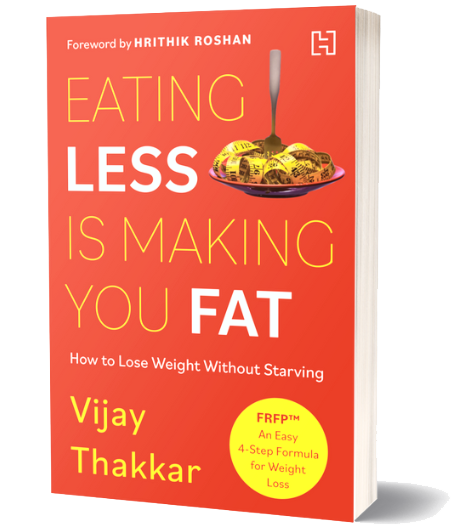When it comes to losing weight or getting a healthy lifestyle we resort to unthinkable ways and yet it’s not always fruitful. However, one of the most traditional, ancient, tried and tested ways to lose weight or adjust to a robust lifestyle is fasting, and not just any kind of fasting but intermittent Fasting for Weight Loss!
What is Intermittent Fasting or IF?
As we all know, not eating for a limited period or restricting your calorie intake for a limited period is acknowledged as fasting globally because of its results although scientifically, the complete abstinence of consumption of foods rich in protein and carbs promotes the hormonal environment of removing energy from their stored deposits into usable form in the body; that’s the typical environment influenced by fasting conditions and that being said, Intermittent Fasting meaning is very simple, it’s a type of fasting that makes your body accustomed to a kind of eating pattern. The word Intermittent means occurring at irregular intervals which defines this particular practice clearly while most people confuse it with starvation which means uncontrolled absence of food and you would not be aware of when it will be the next time for you to get the food.
IF is a lot more different from Food Deprivation as well as food deprivation is basically practiced for 2-3 hours before a treatment meal. Have you ever heard of a person suffering from Starvation? It’s when the body receives no food at all until it utilizes all its stock resources and this is generally caused by poverty or femine that can lead to fatal damage and even death which is also completely different from IF.
How does Intermittent Fasting work?
Done in phases, IF is divided into sets and timely durations to let your body breathe. Rather than focusing on what you should eat, it focuses on when to eat.
The most followed patterns are fasting for 16 hours a day or twice for 24 hours a week.
If you live alone and don’t eat because of laziness, chances are you’ve already done a fast for 16 hours or even more. There’s always a possibility of people having kept a fast unknowingly due to a busy schedule, a medical examination or test, or simply because they were lazy and didn’t feel like eating.
Your body is a machine that requires energy to function, when you give it calories, it converts them into energy which if provided through proper food that is consumed in its natural form with proper soaking and cooking techniques then the passed information to our body matches energy expenditure with energy consumption thereby attaining energy equilibrium in the body through appetite and helps our body understand and match the time of eating with the energy requirements making you not hungry until you require energy. On the other hand if this food provided to the body is in processed and refined form as junk food then the form in which the body receives information on energy intake and expenditure is corrupted and damaged thus leading to diminished expenditure to intake thereby creating an energy mismatch and mismanagement leading to excessive fat accumulation and makes you vulnerable to multiple diseases like obesity, heart conditions, and diabetes.
There are times when you start receiving signals from your body that it’s time you need to stop eating while other times, it’s your inner self that forces you to think of the same.
If you’re confused on how to start then don’t be because you’re already halfway there. You have already been fasting for 8-10 hours everyday as you sleep, just slowly and gradually increasing the window will help you adjust to your desired cycle easily after all, IF is in fact a solution to all these problems.
Heritage & Cultural Dominance:
Fasting has been a part of human evolution since forever, whether forced or by will. In ancient times, most humans relied on food sources by hunting and gathering since there were no supermarkets or refrigerators, and thus, they had to sleep on empty stomachs a lot more as not every day they could find things to eat.
It became a part of religious practices as civilization thrived and not too long after became a trend for people willing to opt for a healthy lifestyle and lose weight.
This Practice generally is also referred to as a diet although since you’re not to eat during a certain period, it is broadly classified as a type of fasting.
So, What is the Intermittent Fasting Diet Plan?
As the name suggests, you eat nothing while you’re in the period of fasting, rather all you do is consume water and zero-calorie-containing drinks like black coffee or tea.
You might get hungry in the process of adjusting to your IF cycles but it rarely is harmful to your health unless you’re undernourished or have some disease that can be triggered again because of fasting.
Although during your eating hours you should make sure you follow a good intermittent fasting diet plan which you can customize as you restrict yourself from eating heavy junk food or carbs and opting for anything that’s natural like grains, green-leafy vegetables, nuts & seeds and more. This clearly means you’ve to say goodbye to all your favorite ice creams, chocolates, pizzas, burgers and any kind of junk food to avoid electrolyte imbalance which is a root cause of binge eating.
What are the Intermittent Fasting Rules?
Different people and experts have different approaches to IF just like any other form of Fasting, however below are some of the most trending and effective rules & methods that people opt for globally, they are also referred to as Intermittent Fasting Schedules.
Time Restriction Method:
The most popular intermittent fasting method all over the globe is the time restriction method and the highly followed fasting window is 16/8 method which is also known as Leangains Protocol. The idea is to simply fast for 16 hours straight and eat 2-3 meals a day in the remaining 8 hours. The alternating fasting and feeding periods ensures that the fat depositing hormone insulin is kept at the minimum during the period of fasting and then it elevates during the 8 hours of feeding. There can be larger or smaller durations depending upon the plan that you want to follow or that suits you. It’s very simple to follow this method, you can start by skipping a meal, say dinner which will mark the beginning of your fast from 4 PM to 8 AM and after 16 hours, you may eat for the next 8 hours but still eat only healthy stuff.
Eat-Stop-Eat:
As the name suggests, you first eat, then stop, and then eat again throughout the week. So you take a break of 24 hours twice the entire week. For example, you skip dinner on Tuesday until Wednesday evening, then you have your dinner and repeat the cycle a couple of days later or a week later depending upon how you’re adjusting to it.
The 5:2 diet:
This one is very simple and yet the most complicated one as you’ve to keep an eye on your calorie count for the day. Here your calorie intake is limited to 500-600 calories on two non-consecutive days of the week while you have permission to eat normally for the rest of 5 days.
Even though people assume this practice is more like a diet, it is scientifically categorized as fasting and there are no such diet plans for IF rather just eating schedules and windows. You can also increase the size of your fasting window after adjusting your body to the eating patterns although if you want to take up larger windows on a regular basis it’s advised to take a professional’s help to stay alert from any harmful effects that might crawl out of the blue.
What are Intermittent fasting Benefits?
Multiple studies have proven that it is one of the most fruitful fasting methods as it helps to keep your brain and body healthy. Some of the studies have also shown chances of longevity.
We already know the broad description of the benefits, let’s dive a little deeper to get a clearer understanding of the benefits that IF brings on the table:
Savings:
the time and money that an individual saves while fasting and not worrying about what to eat in the next meal 3-5 times a day. Unlike organic food which is very expensive, fasting has no hidden costs attached to it.
Weight Loss:
Undoubtedly, Intermittent Fasting helps as a quicker and easier tool for weight loss as most people end up using more fat from fat stores than glucose while they are not eating resulting in fat loss from their problem areas at a faster pace. Due to this state of ceaseless and seamless supply of energy to the body from the fat stores the energy expenditure of our metabolism stays at the highest level.
Additionally, Intermittent Fasting also charges the release rate of our fat burning hormones, Norepinephrine while lowering insulin and increasing the levels of growth hormone.
This method of restricted window feeding protocol is highly proven as a 2014 study shows that this pattern of eating can cause 3-8% of weight loss over 3-24 weeks which is a significant amount of weight loss in any adult as compared to most diets and workout methods ever examined.
You can read the study here:
There’s a very fair point that one must take in account while following this fasting method, that is, it’s based on reduced calorie intake and thus if you binge on junk food during your eating period, the chances of the method not working are comparatively higher.
Inflammation:
Studies have also proven that Intermittent Fasting tends to reduce the level of Inflammation in our body which is a carrier of many chronic diseases and thus resulting in an increased chance of longevity.
Insulin resistance:
Another most important benefit of Intermittent Fasting is that it is very helpful in preventing type 2 Diabetes as it reduces insulin resistance in the body which lowers the level of blood sugar in our body by 3-6% and insulin level during fasting by 20-31% making it the most effective fasting type to be able to bring about such changes.
Brain health:
A few studies have shown that Intermittent Fasting may contribute in the growth of new nerve cell as they produce increased amount of the brain hormone BDNF (Brain-derived neurotrophic factor) which is essential for learning and memory thus leading to a higher chances of protection against Alzheimer’s disease.
Improves Heart Health:
Some studies have shown possibilities of improvement in markers of cardiovascular risk factors such as reduction in LDL and VLDL particles, increase HDL cholesterol, inflammatory markers, blood sugar and as mentioned above insulin resistance along with obesity — all factors that possess a greater and higher risk of developing heart diseases.
Ease of Maintaining a Healthy Lifestyle:
It’s generally observed that people who tend to maintain a healthy lifestyle are often confused about what to eat, when to eat, how to maintain their calorie intake and how to manage it while not affecting their day-to-day chores. It’s comparatively one of the easiest ways to do it as when you end up adjusting to your fixed timespan to eat and avoid eating with classified food that are made of less calories, you get a boost in your practices and end up creating a better way to maintain your healthy lifestyle.
Better Sleep at Night:
One of the most interesting benefits of IF that studies have discovered is that it regulates your circadian rhythm which is responsible for your sleep pattern. A regulated circadian rhythm helps you sleep easily, peacefully and wake up with a refreshing feeling.
Is Intermittent Fasting a Risk to your Health?
It is a fact that whatever you read on the internet is most definitely not for everyone and chances are that you can also be one of those who should avoid it. It’s the same for IFas it can cause severe damage to the ones who are in dire need of nutrients every now and then. Underweight people or people who have a history of medical conditions and nutritional deficiency diseases such as beriberi, pellagra and scurvy must consult a physician before observing any kind of fast as it can be very harmful and disturbing.
Women who are nearing their menstruation cycle or during the cycle also must avoid any kind of fasting, especially the ones that require such large windows of not eating.
Even though IF is beneficial, women should most definitely watch out for sudden changes in their body which are especially occurring after observing the fasts as it may lead to be fatal in the long term. They can still consider fasting but with precautions and care more like slowly adapting to it with very smaller windows and then adjusting to it according to how their body reacts.
Expecting mothers and women in their reproductive age who are planning to conceive should do it under professional guidance.
Would Hunger Strike you?
Yes, Hunger is basically the first and most common side-effect. Your brain is wired in a way that it will make you think of food much more when you’re fasting and you may get more observant towards every single detail that relates to food, maybe an advertisement or just some smell coming from the kitchen.
There is a possibility of you feeling dizzy and your brain might as well not be your biggest supporter as it may try to trick you into believing that without food, you will not survive even a single hour more but eventually this temporary condition resolves and your body slowly adjusts to the new schedules.
Have you ever observed a dry fast? You may ask a Muslim friend to get a better idea of this. When Muslims start fasting during the month of Ramzan, they are initially tempted to food more than they would on normal days but just within a few days their body adapts to the new schedule, it would ask for food around 3 AM and would not feel like eating even while they are cooking until 6-7 PM or the time at which they break their fast and this new habit might even wake them up during nights when Ramzan is over.
Overall, its only on your body on how it welcomes intermittent Fasting although people with the below conditions should either refrain from Fasting completely or seek medical help if they really have to:
- Have a history of eating disorders.
- Have diabetes.
- Take medications.
- Have low blood pressure.
- Women with hormone related issues.
- Have problems with blood sugar regulation.
If you’re healthy and well nourished, Intermittent Fasting will prove to be the perfect option for you as it’s widely known for its easy-going profile.
FAQs
What are the Rules of Intermittent Fasting?
The rules for intermittent fasting are very simple, you are required to not eat for a certain amount of time which is advisibly double of what the eating hours you have in a day although even during your fast you can always have water and zero-calorie drinks like black coffee or tea. The most commonly observed pattern in 16/8 which means to restrict eating for 16 hours and eat only whole food rich in complete protein, naturally occurring fats and fermented fibrous fruits, vegetable, grains, nuts and legumes for 8 hours (The purpose is to limit the low quality food and low nutrient calorie intake so it’s advisable to not eat too much empty and concentrated calories in your eating window).
How long should you do intermittent fasting?
Ideally the fast must last for more than 12 hours for a person to start getting accustomed to the eating pattern but what is generally advised is to fast for either 16 hours a day or for 24 hours twice in a week. These figures initially might seem a little too far-fetched to you, but over time you’ll be able to get a grip on it and be able to surpass it.
Can I eat anything during intermittent fasting?
No, No, this one for sure is a big NO! You cannot eat anything while in the fasting window although you may drink water or zero-calorie beverages like tea, black coffee, apple cider vinegar and more. You should definitely avoid any kind of sweeteners, milk, creams, coconut water, almond milk, alcohol and the so-called diet soda.








